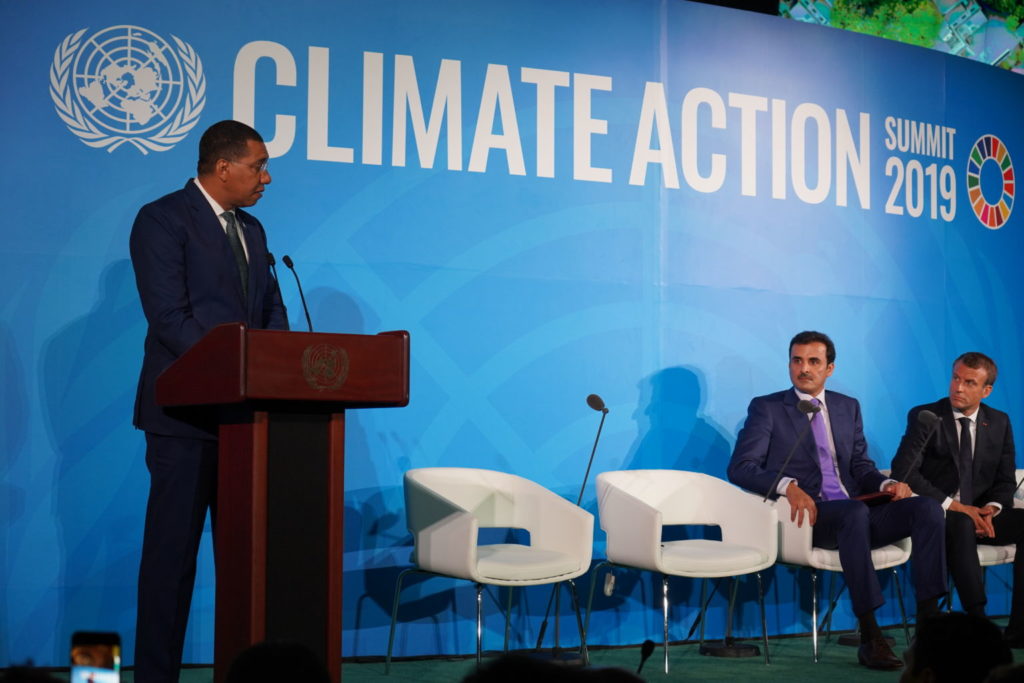High-Level Panel Calls for Healthy Oceans to Mitigating Against Climate Change

Prime Minister Andrew Holness is urging all stakeholders to unite in accelerating the progress on ocean-based Climate Action.
The Prime Minister is part of the High-Level Panel for Sustainable Ocean Economy in New York at the 74th United Nations General Assembly, UNGA.
In a statement this morning (September 23) in the margins of the UNGA, Prime Minister Holness stated that Jamaica fully supports the report which creates a measurable goal to use the ocean as a solution.
“The call to ocean-based climate action being made has the full support of Jamaica as we believe it reflects the ambition required to face the urgency of today’s climate risks. It is my hope that the reports before us will serve as a wake-up call globally. Though not the first report detailing climate risks, it is the first report which creates a measurable road map for using the ocean to provide solutions to the climate emergency we face. Jamaica will examine thoroughly and use it to assist with our national development plan, we know other SIDS will do so as well,” said Minister Holness.
According to Prime Minister Holness, Small Island Developing States (SIDS) like Jamaica and other Caribbean Countries disproportionately face the devastating risks of climate change.
Prime Minister Holness said the world should not forget that Caribbean countries such as Dominica, Antigua & Barbuda, Puerto Rico and most recently the Bahamas have suffered the most extreme damage to their countries due to unprecedented storms.
In delivering his statement the Prime Minister highlighted the commitment that Jamaica has made to ocean-based solutions.
“Allow me to highlight a few of Jamaica’s commitments to our ocean-based solutions in 2020 we will start and assessment of the health of approximately 7000 hectares of existing mangroves and swamp forest and the replanting of over 2000 hectares of mangroves and swamp forests. We have declared approximately 15% of Jamaica’s bio marine resource legally protected through 14 special fisheries conservation areas and two marine parks by 2020 we would have increased this to 20%. By 2020 we will develop a method to support comprehensive and integrated management of all protected areas with an effort to determine the true economic value of marine and coastal ecosystems and to aid in decision making,” said Prime Minister Holness.
In addition, Prime Minister Holness also stated that Jamaica has instituted a single-use plastic banned which has already started to change the composition of the waste stream and reduce the non-biodegradable waste entering the marine environment.
International research suggests that the constant change in climate has presented dangerous risks to ocean health and human wellbeing.
The Intergovernmental Science-Policy Platform on Biodiversity and Ecosystem Services (IPBES) Global Assessment Report emphasized addressing climate change, biodiversity loss and the importance of the ocean to human wellbeing with great urgency.
According to the High-Level Panel, this call to Ocean-Based Climate Action provides a pathway to a low carbon, climate-resilient future that secures a healthy ocean and human wellbeing. We urge all actors to join and take action.”
In that regard, the Panel has recognized the need for cohesive and accelerated ocean action which will be emphasized in the following global events; the UN Climate Conference (the Blue COP25), UN Ocean Conference, UN Convention on Biological Diversity (COP15) and the UN Decade of Ocean Science for Sustainable Development (2021-2030).
In supporting the achievement of the Paris Agreement and the Sustainable Development Goals (SDGs) the High-Level Panel is urging all actors to; Invest in Nature-Based Climate Solutions, Harness Ocean-Based Renewable Energy, Decarbonize Ocean Industries, Secure Sustainable Food for the Future, Advance the Deployment of Carbon Capture and Storage, and Expand Ocean Observation and Research.
In the meantime, the High-Level Panel recognized the specified needs and special circumstances of vulnerable low-lying densely populated coastal cities communities and cities, particularly in small island developing states and least developed countries.